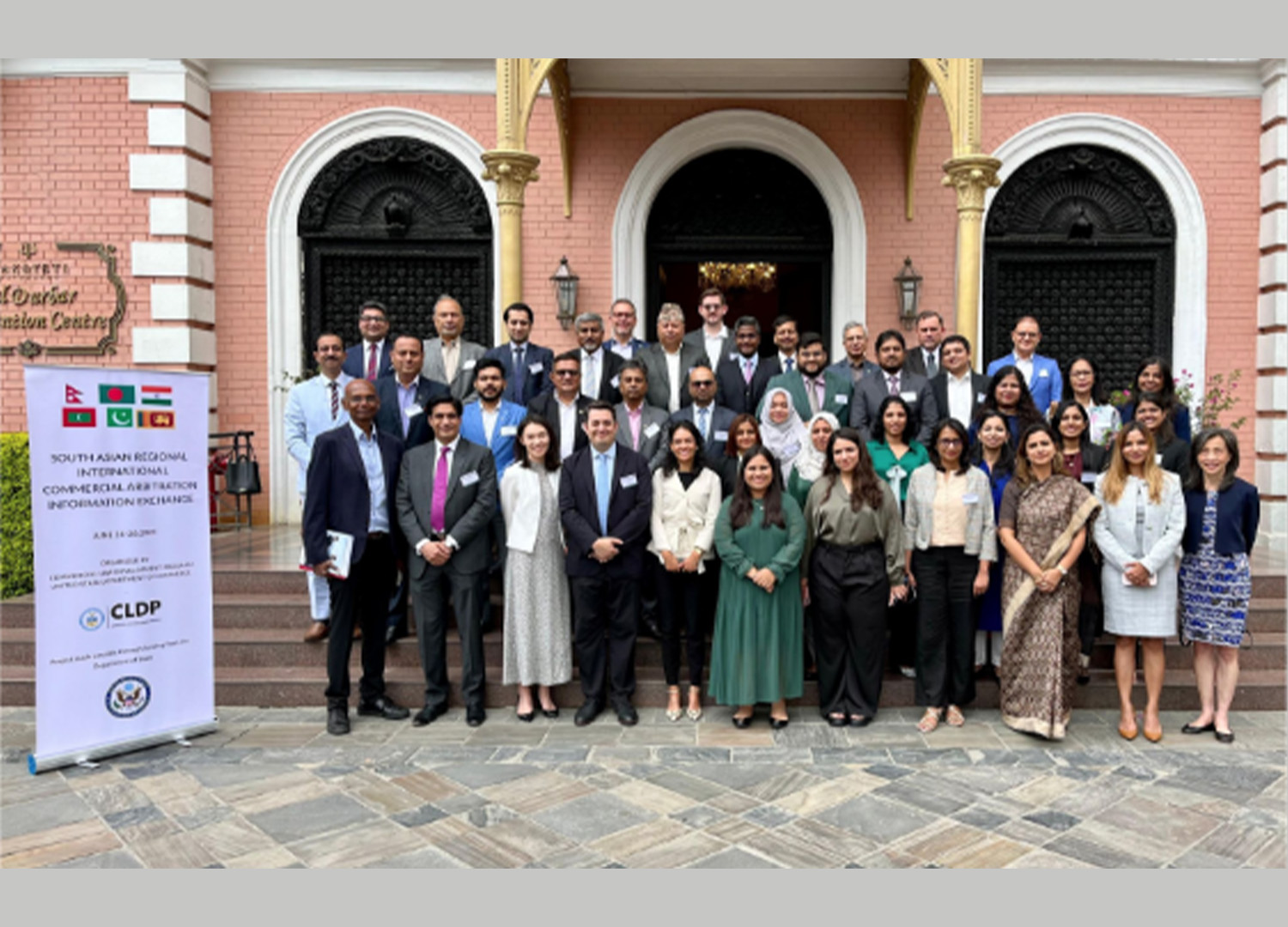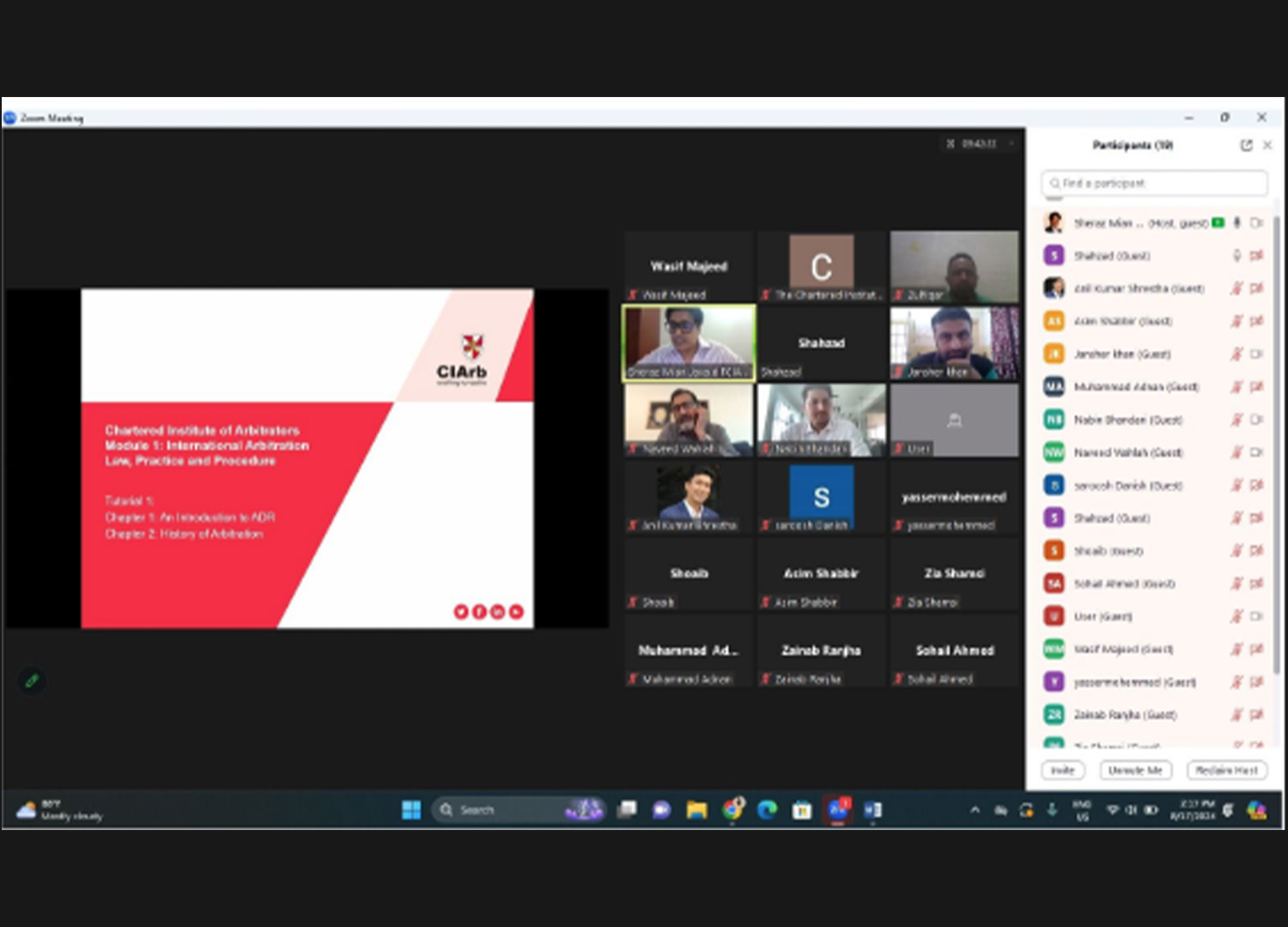Mian Sheraz Javaid: Sharing Expertise in International Commercial Arbitration at Nepal Training Program
From June 24 to June 26, 2024, the picturesque capital of Nepal was abuzz with activity as legal practitioners from South Asia and beyond gathered for an intensive three-day training program on international commercial arbitration. Hosted at the Nepal Council of Arbitration (NEPCA), the South Asia Regional International Commercial Arbitration Information Exchange proved to be a remarkable event, with Mian Sheraz Javaid serving as one of the expert trainers. The training program was organised under the Commercial Law Development Program (CLDP) and intended to bolster the global framework of Alternative Dispute Resolution.
Day 1: Laying the Foundations
The first day of the training opened with introductory remarks from Grishma Pradhan, Attorney-Advisor at CLDP, setting the stage for the intensive sessions to follow.
Session 1 focused on “The Arbitration Agreement,” delivered by Chandra Mohan Rethnam, who elaborated on the foundational aspects of drafting effective arbitration agreements.
The second session, “Conflict of Laws,” was presented by Tony Andriotis, shedding light on the complex interplay of jurisdictions and applicable laws in arbitration proceedings.
During Session 3, Sheraz then took the stage, where he discussed "The Enforcement of Arbitral Awards and Reciprocity." Being very experienced in arbitration, he touched upon the problems in the enforcement of awards across borders and the role of reciprocity in arbitration law.
Session 4 rounded off the day, focusing on “Defences Against Enforcement of Arbitral Awards,” providing participants with a comprehensive understanding of strategies that parties may use to resist enforcement.
Day 2: Diving into Procedural Nuances
The second day saw a deeper dive into the procedural and ethical aspects of arbitration.
Chandra Mohan Rethnam began the day with Session 5, “Conducting an Arbitration,” which outlined the step-by-step process of managing an arbitration proceeding.
In Session 6, Tony Andriotis explored the “Evidence/IBA Rules/Disclosure Process,” offering practical insights into handling evidence and adhering to international standards.
Sheraz returned for Session 7, delivering a highly engaging session on “Choosing an Arbitrator/Arbitrator Ethics Guidelines/Challenges to Arbitrators Once Appointed.” He discussed the critical factors involved in selecting arbitrators, maintaining ethical standards, and addressing challenges that may arise after appointments.
Session 8, titled “Common Myths, Pitfalls, and Misconceptions in Commercial Arbitration,” was jointly delivered by Andriotis and Sheraz. Their collaborative approach provided participants with valuable clarifications and real-world examples to debunk common misconceptions in arbitration practice.
Day 3: Building a Supportive Framework
The final day shifted focus toward creating a supportive legal environment for arbitration.
Yuko Nitta led Sessions 9 and 10, emphasizing the importance of “Building a Supportive Legal Framework” to ensure the effective implementation of arbitration laws.
Sheraz joined Andriotis in concluding the program with Sessions 11 and 12, which included lessons learnt from the training and a general discussion. Participants shared insights, reflected on their learning, and discussed strategies for applying the knowledge gained in their respective jurisdictions.
A Comprehensive Learning Experience
Such a three-day training program was aimed at practical skills and knowledge for the practitioners to face arbitration proceedings effectively. Sheraz said, "This course was a comprehensive endeavor designed with the objective of equipping practitioners with practical insights of managing an arbitration proceeding. Such training sessions are important since arbitration's growing momentum is supported by such educational efforts.
He also commended the CLDP for its dedication to advancing understanding and promoting arbitration across borders. “CLDP shows remarkable initiative in developing understanding and fostering momentum for arbitration, greatly benefiting the professional community,” Sheraz added.
Acknowledgments
Sheraz expressed his gratitude to those who made the event a success, offering special thanks to Grishma Pradhan and Tony Andriotis for inviting him to be part of the training. He also extended his appreciation to Mark Warburton and Chimai Tran-Luu for their contributions and support.
Strengthening the Global ADR Framework
The South Asia Regional International Commercial Arbitration Information Exchange exemplifies the growing importance of arbitration as an effective means of resolving disputes. By bringing together experts like Mian Sheraz Javaid and a diverse cohort of practitioners, the event reinforced the collaborative spirit needed to advance ADR mechanisms in the region.
Participants departed with a newfound appreciation for arbitration processes while adopting a renewed sense of committing themselves to strengthening the ADR framework in their own countries. The future of international arbitration in South Asia seems all the brighter with experts like Sheraz on the ground.
The event served as a testament to the power of knowledge exchange and collaboration in addressing the complexities of modern arbitration. As practitioners carry forward the lessons learned, they contribute to building a more robust and efficient arbitration ecosystem that transcends borders.






